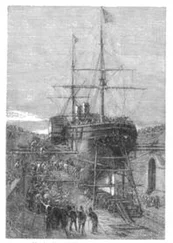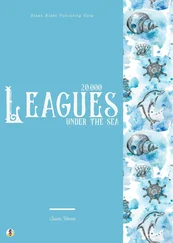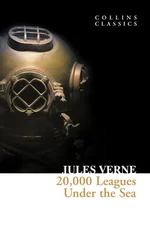Jules Verne - Twenty Thousand Leagues Under the Sea
Здесь есть возможность читать онлайн «Jules Verne - Twenty Thousand Leagues Under the Sea» — ознакомительный отрывок электронной книги совершенно бесплатно, а после прочтения отрывка купить полную версию. В некоторых случаях можно слушать аудио, скачать через торрент в формате fb2 и присутствует краткое содержание. Жанр: sf_writing, на английском языке. Описание произведения, (предисловие) а так же отзывы посетителей доступны на портале библиотеки ЛибКат.
- Название:Twenty Thousand Leagues Under the Sea
- Автор:
- Жанр:
- Год:неизвестен
- ISBN:нет данных
- Рейтинг книги:5 / 5. Голосов: 2
-
Избранное:Добавить в избранное
- Отзывы:
-
Ваша оценка:
- 100
- 1
- 2
- 3
- 4
- 5
Twenty Thousand Leagues Under the Sea: краткое содержание, описание и аннотация
Предлагаем к чтению аннотацию, описание, краткое содержание или предисловие (зависит от того, что написал сам автор книги «Twenty Thousand Leagues Under the Sea»). Если вы не нашли необходимую информацию о книге — напишите в комментариях, мы постараемся отыскать её.
Twenty Thousand Leagues Under the Sea — читать онлайн ознакомительный отрывок
Ниже представлен текст книги, разбитый по страницам. Система сохранения места последней прочитанной страницы, позволяет с удобством читать онлайн бесплатно книгу «Twenty Thousand Leagues Under the Sea», без необходимости каждый раз заново искать на чём Вы остановились. Поставьте закладку, и сможете в любой момент перейти на страницу, на которой закончили чтение.
Интервал:
Закладка:
The second stranger merits a more detailed description. A disciple of Gratiolet or Engel would have read his face like an open book. I made out his prevailing qualities directly: self-confidence-because his head was well set on his shoulders, and his black eyes looked around with cold assurance; calmness-for his skin, rather pale, showed his coolness of blood; energy-evinced by the rapid contraction of his lofty brows; and courage-because his deep breathing denoted great power of lungs.
Whether this person was thirty-five or fifty years of age, I could not say. He was tall, had a large forehead, straight nose, a clearly cut mouth, beautiful teeth, with fine tapered hands, indicative of a highly nervous temperament. This man was certainly the most admirable specimen I had ever met. One particular feature was his eyes, rather far from each other, and which could take in nearly a quarter of the horizon at once.
This faculty-I verified it later-gave him a range of vision far superior to Ned Land's. When this stranger fixed upon an object, his eyebrows met, his large eyelids closed around so as to contract the range of his vision, and he looked as if he magnified the objects lessened by distance, as if he pierced those sheets of water so opaque to our eyes, and as if he read the very depths of the seas.
The two strangers, with caps made from the fur of the sea otter and shod with sea boots of seals' skin, were dressed in clothes of a particular texture, which allowed free movement of the limbs. The taller of the two, evidently the chief on board, examined us with great attention, without saying a word; then turning to his companion, talked with him in an unknown tongue. It was a sonorous, harmonious, and flexible dialect, the vowels seeming to admit of very varied accentuation.
The other replied by a shake of the head, and added two or three perfectly incomprehensible words. Then he seemed to question me by a look.
I replied in good French that I did not know his language; but he seemed not to understand me, and my situation became more embarrassing.
"If master were to tell our story," said Conseil, "perhaps these gentlemen may understand some words."
I began to tell our adventures, articulating each syllable clearly, and without omitting one single detail. I announced our names and rank, introducing in person Professor Aronnax, his servant Conseil, and Master Ned Land, the harpooner.
The man with the soft calm eyes listened to me quietly, even politely, and with extreme attention; but nothing in his countenance indicated that he had understood my story. When I finished he said not a word.
There remained one resource, to speak English. Perhaps they would know this almost universal language. I knew it, as well as the German language-well enough to read it fluently, but not to speak it correctly. But anyhow, we must make ourselves understood.
"Go on in your turn," I said to the harpooner; "speak your best Anglo-Saxon, and try to do better than I."
Ned did not beg off, and recommenced our story.
To his great disgust, the harpooner did not seem to have made himself more intelligible than I had. Our visitors did not stir. They evidently understood neither the language of Arago nor of Faraday.
Very much embarrassed, after having vainly exhausted our philological resources, I knew not what part to take, when Conseil said:
"If master will permit me, I will relate it in German."
But in spite of the elegant turns and good accent of the narrator, the German language had no success. At last, nonplussed, I tried to remember my first lessons, and to narrate our adventures in Latin, but with no better success. This last attempt being of no avail, the two strangers exchanged some words in their unknown language and retired.
The door shut.
"It is an infamous shame," cried Ned Land, who broke out for the twentieth time; "we speak to those rogues in French, English, German, and Latin, and not one of them has the politeness to answer!"
"Calm yourself," I said to the impetuous Ned, "anger will do no good."
"But do you see, professor," replied our irascible companion, "that we shall absolutely die of hunger in this iron cage?"
"Bah," said Conseil philosophically; "we can hold out some time yet."
"My friends," I said, "we must not despair. We have been worse off than this. Do me the favor to wait a little before forming an opinion upon the commander and crew of this boat."
"My opinion is formed," replied Ned Land sharply. "They are rascals."
"Good! And from what country?"
"From the land of rogues!"
"My brave Ned, that country is not clearly indicated on the map of the world; but I admit that the nationality of the two strangers is hard to determine. Neither English, French, nor German, that is quite certain. However, I am inclined to think that the commander and his companion were born in low latitudes. There is southern blood in them. But I cannot decide by their appearance whether they are Spaniards, Turks, Arabians, or Indians. As to their language, it is quite incomprehensible."
"There is the disadvantage of not knowing all languages," said Conseil, "or the disadvantage of not having one universal language."
As he said these words, the door opened. A steward entered. He brought us clothes, coats and trousers, made of a stuff I did not know. I hastened to dress myself, and my companions followed my example. During that time, the steward-dumb, perhaps deaf-had arranged the table, and laid three plates.
"This is something like," said Conseil.
"Bah," said the rancorous harpooner, "what do you suppose they eat here? Tortoise liver, filleted shark, and beefsteaks from sea dogs."
"We shall see," said Conseil.
The dishes, of bell metal, were placed on the table, and we took our places. Undoubtedly we had to do with civilized people, and had it not been for the electric light which flooded us, I could have fancied I was in the dining-room of the Adelphi Hotel at Liverpool, or at the Grand Hotel in Paris. I must say, however, that there was neither bread nor wine. The water was fresh and clear, but it was water, and did not suit Ned Land's taste. Among the dishes which were brought to us, I recognized several fish delicately dressed; but of some, although excellent, I could give no opinion, neither could I tell to what kingdom they belonged, whether animal or vegetable. As to the dinner service, it was elegant, and in perfect taste. Each utensil, spoon, fork, knife, plate, had a letter engraved on it, with a motto above it, of which this is an exact facsimile:
MOBILIS IN MOBILI
The letter N was no doubt the initial of the name of the enigmatical person who commanded at the bottom of the seas.
Ned and Conseil did not reflect much. They devoured the food, and I did likewise. I was, besides, reassured as to our fate; and it seemed evident that our hosts would not let us die of want.
However, everything has an end, everything passes away, even the hunger of people who have not eaten for fifteen hours. Our appetites satisfied, we felt overcome with sleep.
"Faith! I shall sleep well," said Conseil.
"So shall I," replied Ned Land.
My two companions stretched themselves on the cabin carpet, and were soon sound asleep. For my own part, too many thoughts crowded my brain, too many insoluble questions pressed upon me, too many fancies kept my eyes half open. Where were we? What strange power carried us on? I felt-or rather fancied I felt-the machine sinking down to the lowest beds of the sea. Dreadful nightmares beset me; I saw in these mysterious asylums a world of unknown animals, among which this submarine boat seemed to be of the same kind, living, moving, and formidable as they. Then my brain grew calmer, my imagination wandered into vague unconsciousness, and I soon fell into a deep sleep.
Читать дальшеИнтервал:
Закладка:
Похожие книги на «Twenty Thousand Leagues Under the Sea»
Представляем Вашему вниманию похожие книги на «Twenty Thousand Leagues Under the Sea» списком для выбора. Мы отобрали схожую по названию и смыслу литературу в надежде предоставить читателям больше вариантов отыскать новые, интересные, ещё непрочитанные произведения.
Обсуждение, отзывы о книге «Twenty Thousand Leagues Under the Sea» и просто собственные мнения читателей. Оставьте ваши комментарии, напишите, что Вы думаете о произведении, его смысле или главных героях. Укажите что конкретно понравилось, а что нет, и почему Вы так считаете.












